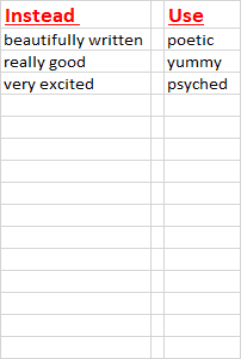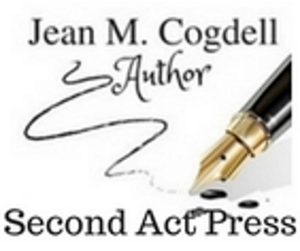I love finding great writing tips!

Thanks, today goes to Patricia Lynne for ways to substitute the word very.
I don’t know about you but sometimes I get into a very rut. I try not to worry about using words like very when in draft mode. But when it comes time to edit, that word needs to get scarce.
And that’s where Patricia’s cheat sheet comes in handy.
 If you’re searching for an expression to explain how very excited (psyched) a character is, check out her post and learn how to avoid very.
If you’re searching for an expression to explain how very excited (psyched) a character is, check out her post and learn how to avoid very.
Or if you are very tired (weary) of using crutch words you might want to click on OneLook Reverse Dictionary. Just type in the phrase and up pops suggestions. Give it a try and begin your own vocabulary cheat sheet. Excel and Microsoft Word are perfect for making your own list.










Thank you so much for these links. As somebody who uses ‘very’ a lot, this is perfect for me for getting out of the habit of using ‘very.’ I’ll be sharing this post on Twitter, Flipboard and StumpleUpon.
LikeLiked by 1 person
Thanks Hugh for sharing. Glad you liked the tips
LikeLiked by 1 person
YES! This. is. me.
From time to time I do a full-text-search and look up allllll the “very”s and see if I can substitute for a more accurate word.
I do the same for “start”, “starting”, “begin” and “beginning” — because let’s be honest – characters don’t “start to run”; don’t “begin to look for something”. They run. They search. Right?
But – I DO need to set up a list with all those small glitches that sneak into the prose.
LikeLiked by 1 person
I think we all have crutch words. You’re not alone. LOL 😉
LikeLike
Thank you. This is a thesaurus on steroids and so easy to use. I’ve got it bookmarked.
LikeLiked by 1 person
Glad you found it useful. 🙂
LikeLiked by 1 person
Yes, I love cheat sheets. However, when I need to look at them, I tend (I almost put an adverb there) to forget where I saved them. I use the Hemingway Editor that looks for adverbs and lets you know if you have too many for the number of words written. It also points out passive words and other things that I can’t remember right now.
LikeLiked by 1 person
Love the Hemingway Editor too! I put cheat sheets and special links on my desk top screen, easier to find. Thanks for the reblog!
LikeLiked by 1 person
Reblogged this on Kim's Author Support Blog.
LikeLiked by 1 person
Thank you for this, Jean. In addition, I use Angela Ackerman’s The Emotion Thesaurus which suggests phrases to avoid bland words. Also, I frequently turn to dictionary.com’s thesaurus for synonyms or more precise words to substitute for the lame and hackneyed.
LikeLiked by 1 person
I’ve several of Angela’s books. Love them too!
LikeLiked by 1 person
I never use the word very,Jean, but I have lots of other lame words that I have to edit out (including most words ending in LY. I keep a list of those that I attack on each WIP. Excellent post. I like the reverse Thesaurus. 😀
LikeLiked by 1 person
I use OneLook often. Helps me think outside the box. I don’t think all ly words are bad but an over abundance might be. 🙂
LikeLiked by 1 person
I agree, sometimes an adverb is the perfect word, but often I like to be shown the qualifier versus being told about it. Writing “rules” are all so nuanced that an author is always having to make choices. 😀
LikeLiked by 1 person
So true. 🙂
LikeLiked by 1 person
Jean, thank you, this is helpful. 🙂
LikeLiked by 1 person
Glad it helped. I love cheat sheets. 🙂
LikeLike
Reblogged this on Chris The Story Reading Ape's Blog.
LikeLiked by 1 person
Reblogged this on Viv Drewa – The Owl Lady.
LikeLiked by 1 person
Thanks Viv
LikeLike